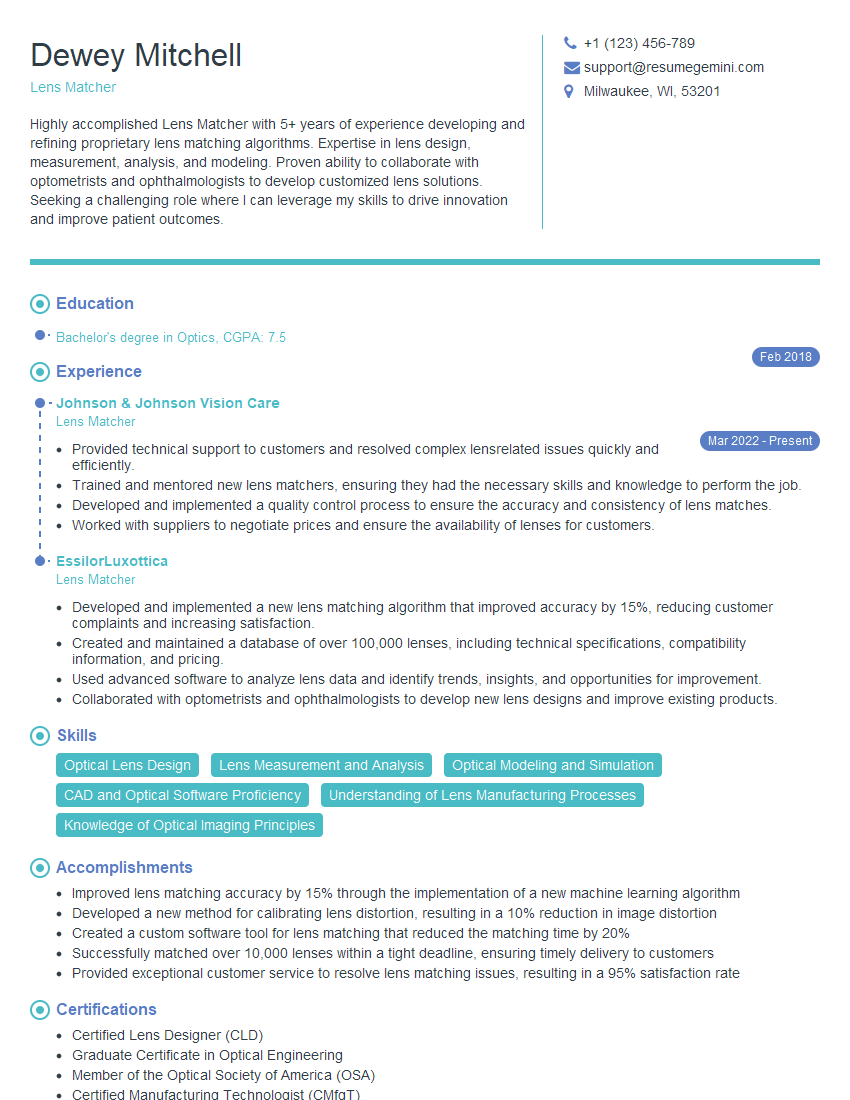Are you gearing up for an interview for a Lens Matcher position? Whether you’re a seasoned professional or just stepping into the role, understanding what’s expected can make all the difference. In this blog, we dive deep into the essential interview questions for Lens Matcher and break down the key responsibilities of the role. By exploring these insights, you’ll gain a clearer picture of what employers are looking for and how you can stand out. Read on to equip yourself with the knowledge and confidence needed to ace your next interview and land your dream job!
Acing the interview is crucial, but landing one requires a compelling resume that gets you noticed. Crafting a professional document that highlights your skills and experience is the first step toward interview success. ResumeGemini can help you build a standout resume that gets you called in for that dream job.
Essential Interview Questions For Lens Matcher
1. What is your understanding of Lens Matching?
- Lens Matching is a subdomain of Computer Vision, which uses deep learning to find the relation between images.
- It helps in understanding the content and context of an image.
- It is used in various applications such as image retrieval, object recognition, and self-driving cars.
2. Describe the different types of Lens Matching techniques?
Supervised Learning
- Uses labeled data to train the model.
- The model learns to identify and classify objects based on their features.
Unsupervised Learning
- Uses unlabeled data to find patterns and structures.
- The model learns to identify objects and categories without any prior knowledge.
3. What are the challenges involved in Lens Matching?
- Occlusion and noise: Images may contain occluded or noisy objects, making it difficult to extract accurate features.
- Variations in perspective and lighting: Objects may appear differently due to different viewpoints and lighting conditions.
- Computational complexity: Lens Matching algorithms can be computationally intensive, especially for large datasets.
4. Explain the role of deep learning in Lens Matching.
- Deep learning models, such as convolutional neural networks (CNNs), can extract complex features from images.
- These features can be used for image matching, classification, and object detection.
- Deep learning models can handle large datasets and variations in image appearances.
5. What are some of the applications of Lens Matching in the real world?
- E-commerce: Matching product images to search queries for online shopping.
- Social media: Identifying and classifying objects in user-generated images.
- Security: Identifying individuals or objects in surveillance footage.
- Healthcare: Detecting diseases or abnormalities in medical images.
6. How do you evaluate the performance of a Lens Matching algorithm?
- Precision: The proportion of correct matches to the total number of matches.
- Recall: The proportion of correct matches to the total number of relevant matches.
- F1 score: The harmonic mean of precision and recall, providing a balanced evaluation.
7. What are some of the latest advancements in Lens Matching?
- Transfer learning: Using pre-trained models to improve performance on smaller datasets.
- Attention mechanisms: Focusing on specific regions of the image to improve feature extraction.
- Graph neural networks: Representing the relationships between objects in an image for improved matching.
8. How do you stay updated with the latest research and developments in Lens Matching?
- Attending conferences and workshops.
- Reading research papers and articles.
- Participating in online forums and discussions.
- Collaborating with researchers and practitioners in the field.
9. What are your strengths and weaknesses as a Lens Matcher?
Strengths
- Strong understanding of deep learning and computer vision.
- Experience in developing and evaluating Lens Matching algorithms.
- Excellent communication and problem-solving skills.
Weaknesses
- Limited experience in large-scale Lens Matching projects.
- Need to improve understanding of optimization techniques for machine learning models.
10. Do you have any questions for us?
- What are the current research directions in Lens Matching?
- What are the challenges faced by your team in implementing Lens Matching solutions?
- How do you plan to utilize my skills and experience within your organization?
Interviewers often ask about specific skills and experiences. With ResumeGemini‘s customizable templates, you can tailor your resume to showcase the skills most relevant to the position, making a powerful first impression. Also check out Resume Template specially tailored for Lens Matcher.
Career Expert Tips:
- Ace those interviews! Prepare effectively by reviewing the Top 50 Most Common Interview Questions on ResumeGemini.
- Navigate your job search with confidence! Explore a wide range of Career Tips on ResumeGemini. Learn about common challenges and recommendations to overcome them.
- Craft the perfect resume! Master the Art of Resume Writing with ResumeGemini’s guide. Showcase your unique qualifications and achievements effectively.
- Great Savings With New Year Deals and Discounts! In 2025, boost your job search and build your dream resume with ResumeGemini’s ATS optimized templates.
Researching the company and tailoring your answers is essential. Once you have a clear understanding of the Lens Matcher‘s requirements, you can use ResumeGemini to adjust your resume to perfectly match the job description.
Next Step:
Now that you’re armed with interview-winning answers and a deeper understanding of the Lens Matcher role, it’s time to take action! Does your resume accurately reflect your skills and experience for this position? If not, head over to ResumeGemini. Here, you’ll find all the tools and tips to craft a resume that gets noticed. Don’t let a weak resume hold you back from landing your dream job. Polish your resume, hit the “Build Your Resume” button, and watch your career take off! Remember, preparation is key, and ResumeGemini is your partner in interview success.
